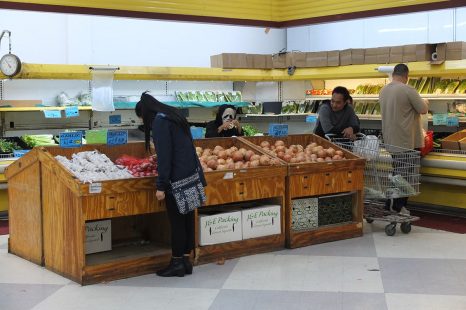sachiko learning to do a backflip in katsuhito ishii’s “the taste of tea”
Posted by f | reply »但願您也在這裡 (finding greetings series no. 2)
布拉格 prague – 舊金山 san francisco

kostel sv. mikuláše na starém městě (the church of St. Nicholas on the Old Town)
i wanted to be everywhere, all the time. but somehow time stumbled, fell down, and we were led to change genres because nobody took us seriously. or was it simply taking the time to get back to roots, ironic after that white dude’s patronising joke thirteen years ago (so you came to China to find your roots, eh?), me and my roots, everywhere, all the time. keeping it real is just something really really difficult, you know.
you know, just letting you know, you’ll be an arrival point because there’s a one-way love letter at stake, like determined roots and you, the water between my fingers.
重慶 chongqing – 星加坡 singapore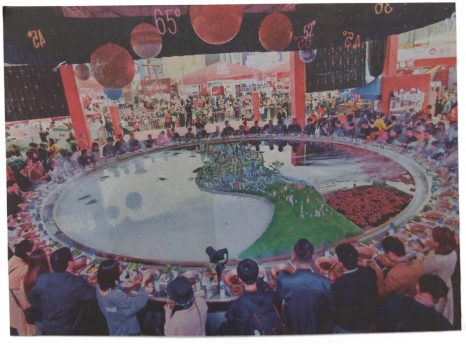
a hearty welcome: a massive dish showcasing Chongqing’s sprawling high-rises greets visitors at the opening of the Hotpot Cuisine Culture Festival yesterday. The pot——a reflection of Chinese people’s culinary passion——is divided into two, with half containing light-flavoured broth and the other half, a spicy variation. Models of skyscrapers sit in the middle. The municipality is widely regarded as the origin of hotpot.
紐約 new york – 紐約 new york
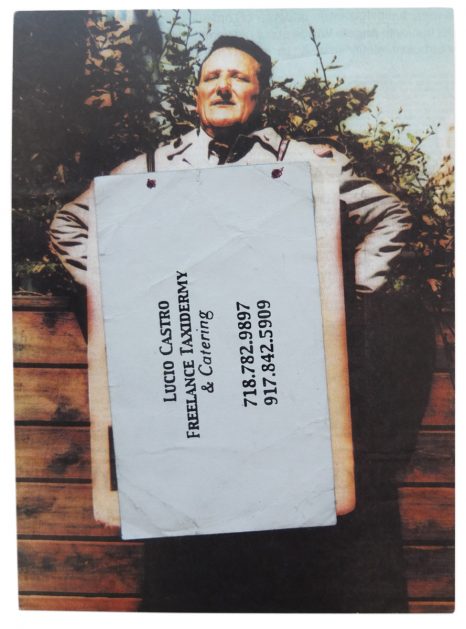
i started to realise the meaning of repetition. maybe because i was once a teacher, and that’s what one does in school, spinning drills, tires as hips. an exercise machine for getting old and being afraid of being forgotten.
you weren’t so didactic, but romantic still loops. we won’t call it like that because you wanted agency, 醒了 and 行了 again and again, aware of pretentions, but what recourse is there? you make your bed.
i make it again and again. and realise that actually that arendt bit is about systems, too. about the ecology of ‘it’s hard to be a good person’, being holistically compromised. about the distance between a sender and a receiver, about the logistical operations of the greatest love poets——”close to cynicism the way comedians are close to sadness”.
you realise、 you rise、 醒了 (a doubt about wokeness)、 行了.
finding greetings series no. 1 (但願您也在這裡)
excerpt from Radio Corax broadcast 13 August 2018, with Claire Serres
無聊的風(氣)the wind of boredom - 多倫多 Toronto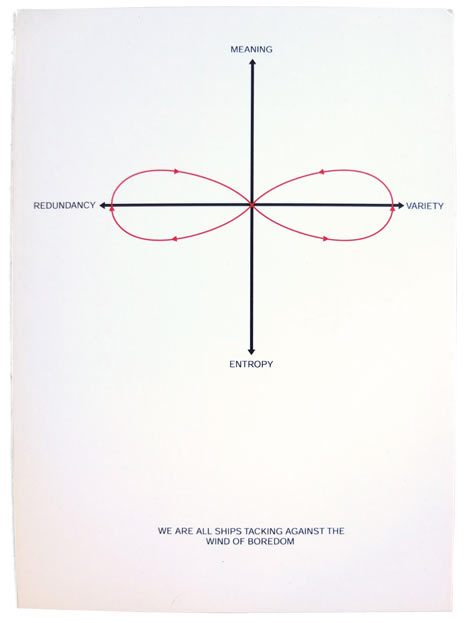
阿姆斯特丹 Amsterdam - 羅特丹 Rotterdam
達拉斯 Dallas - 水牛城 Buffalo Front gate of the legendary Southfork Ranch, made famous by the Ewing family in the 80s television series Dallas.
Front gate of the legendary Southfork Ranch, made famous by the Ewing family in the 80s television series Dallas.
巴哈馬群島 Bahamas - 上海 Shanghai
香港 Hong Kong - 柏林 Berlin View from the Peak of Central Business District at Night
View from the Peak of Central Business District at Night
利比里亞 Liberia - 東京 Tokyo Carnival: The Most Popular Cruise Line in the World
Carnival: The Most Popular Cruise Line in the World
阿姆斯特丹 Amsterdam - 烏特勒支 Utrecht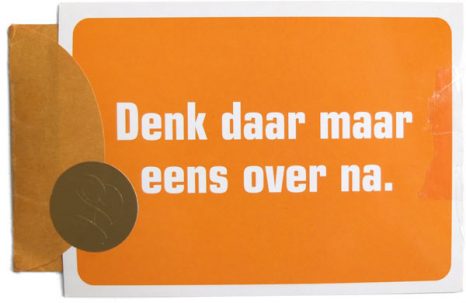
倫敦 London - 烏特勒支 Utrecht Women’s Barracks (1950)
Women’s Barracks (1950)
Cover Artist: Barye Phillips
图珀洛 Tupelo - 上海 Shanghai
 Elvis Presley was born in this house January 8, 1935. The dwelling built by his father, is located in Tupelo, Mississippi, and is open to the public.
Elvis Presley was born in this house January 8, 1935. The dwelling built by his father, is located in Tupelo, Mississippi, and is open to the public.
樓梯破洞 hole in stairwell - 舊金山 San Francisco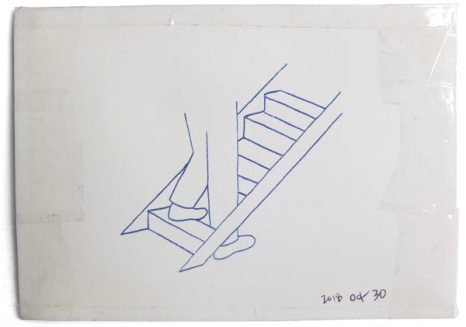
基韋斯特 Key West - 根特 Ghent Key West now boasts bicycle policemen. Shown here, at the southernmost point in Key West, are two of them ready to do their duty.
Key West now boasts bicycle policemen. Shown here, at the southernmost point in Key West, are two of them ready to do their duty.
發您的郵編地址到ho[at]iwishicoulddescribeittoyoubetter[dot]net ,收來自哪裡哪裡的祝福⋯⋯
Send your postal address to ho[at]iwishicoulddescribeittoyoubetter[dot]net for greetings from somewhere⋯⋯
達拉斯 Dallas - 柏林 Berlin/柏林 Berlin/海牙 Den Haag/太原 Tai Yuan
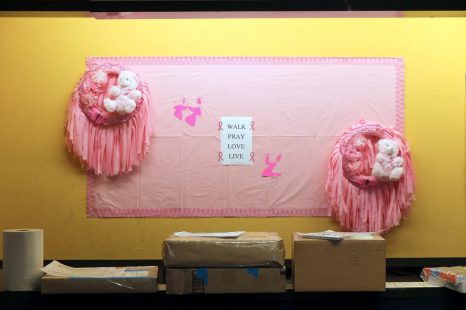 United States Postal Service Dallas, Texas, Preston Royal location, 29 October 2018
United States Postal Service Dallas, Texas, Preston Royal location, 29 October 2018
a frightful and weepy one
small scream peeling onions on the eve of all saints
Posted by 丫 | reply »wedged in something that has to do with the world
Science went away for some time, but left rusty Technic behind. There was a small key with a black plastic coated head. We unlocked her and rode with her rhythms, though something kept nerves piqued at the same time as familiarity made everything gummy inside. The remembering of being here before, when things were more regular, and this was before you knew Science, when things were simply intuitive. But now your muscles were taut and that thing on the back kept falling off and you didn’t know if it was your doing or not or if we would survive until Science came back.
In the end you left before she did, and your tight outer edges and chewy fillings didn’t know what to do with the small key except, on the way out, wedge it quickly between something that has to do with the world or the universe. Technic was left outside to nature.
It should have been one week, but it was months, months, months. Where on the flattened earth does Science go? You worried for a moment until you forgot. And by the time she came back looking for worlds in universes, you couldn’t quite remember the game either, only that you had been looking downwards, so it must have been about waist height. She played several rounds over a few more weeks, and almost even lost it for a second.
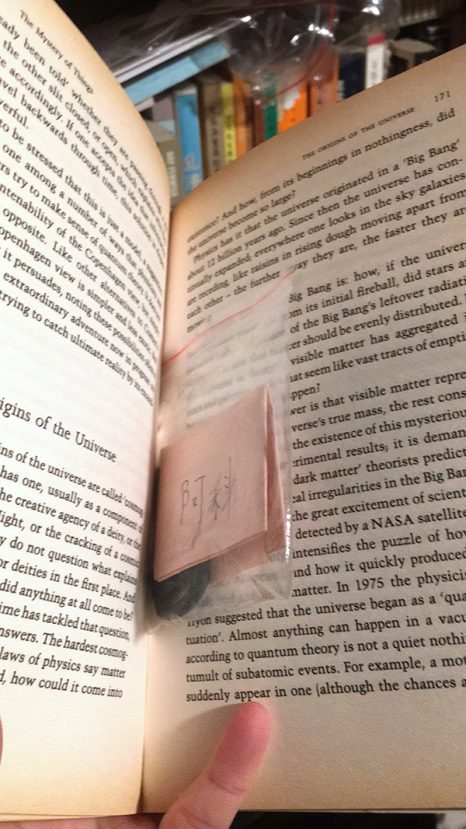
 the best review i’ll ever receive
the best review i’ll ever receive
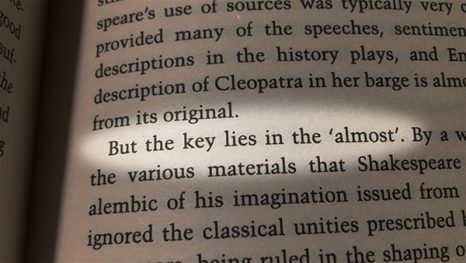 攝影 photos // 阿科 a KE
攝影 photos // 阿科 a KE
Posted by 丫 | reply »
首爾蘑菇筆記 Spore-adic Notes for Seoul
 Y’s drawing appeared on his leg a few weeks later…
Y’s drawing appeared on his leg a few weeks later…
Having left out the exact words i had meant to express to her, i sent the e-mail a second time: “oh, before i meant to say: ‘and despite *my fear and nervousness*…’ ” Fear and nervousness to be left out at all costs, if we are to talk about serendipity. Except that it’s a silly word. Except that we couldn’t find the right word in Korean. Because 緣份 is more than serendipity, if we are talking about circles of time, letting things be, how we got here in the first place. I will try to forget about my fear and nervousness, to find comfort in someone else’s words, like D. says—“理論很舒服”。
It’s the resonance that she means here, and that is to say a——let’s call it ‘pleasant’——reverberation between the two.
(it’s funny how that’s never really so acceptable in art economies)
 from “Things That are Massively Distributed” by Alma HEIKKILÄ
from “Things That are Massively Distributed” by Alma HEIKKILÄ
Y.Y. and I.S. made an exhibition with the exact same name as our project a few months ago. I didn’t know, I really didn’t know! Clumsily avoided saying too much afterwards except the utterly boring, “I really liked your show”, and basically also delayed to read the accompanying publication, for fear of inadvertently finding too much resonance. But then one thinks they should be doing more research, the spores have already been released and——let’s take small comfort in numbers again——I.S. does write about three plus one becoming understandings of the word ‘catalogue’, so one and one and one and one…new appendages would be the point of these communiqué—let’s grow into our new eachother bodies.
(a question to you though, why does agency become automatically associated in singularities?)
 from “Catalogue Essay” by Isabelle Sully, Catalogue (Publication Studio Rotterdam, 2018)
from “Catalogue Essay” by Isabelle Sully, Catalogue (Publication Studio Rotterdam, 2018)
And then at the cusp of their heat wave, the one that makes a girl conditioned to heat and sweat giggle, other Girls Like Us picked up the same networks of drifting mycellium, and they deconstructed the magazine in another magasin, taking off and piling up, cushions and colours and all forms of care…

from the Girls Like Us workshop; A School, A Park 2018
We keep talking about things that spread and circulate. People, goods, ideas, memes, mycelia. All that fussing about, when actually the question of survival, of making a home (outdated concept?) is a very concentrated, tiny little thing. Like focusing upon words across lines, line to line, and all the networks in the world following through to that little nub at the end of a serif font. And of course it’s no end, Borges, the sentences continue, and your train of thought goes somewhere else. I’ve misunderstood you.

Dear Anna,
Today we had a very nice discussion centring around your book with our collaborators from Read-in and Kunci, and together we came up with a few questions to ask you:

M. has mentioned several times about needing to find out again the name of the Japanese scholar who talked about our Asian spinelessness. In Eastern ontology of print there was no spine. The book was a scroll. Does the spine allude to a ‘Western rigidity’ and an obsession with structure and order? “We have no spine but that will be something that we’ll talk about.”
(but to have the courage to talk about it, i’ll have to forget my fear and nervousness)
To mention in speech what somebody else has said is perhaps a way of ‘owning it’. Or what are the footnotes of speech? Can the simultaneity of attributions be translated in real-time, like ASMR tingles and little cartoon devils on shoulders? And what if you are the one who is really terrible at telling stories, at making the punchline of the joke work? No, I think I’m funnier in Chinese.
But what I really wanted to tell you about is something that has half-slipped my memory for at least ten years now, though the other half of it keeps coming up every now and again, like those waves of text while walking.
I read you here and I read you there, here and there, like a spore trapped in my memory because I will always remember the fuzz of something in the vicinity of you on the page. At the same time I know exactly where you are, left or right, a third of the way down…everything else in darkness as we rode a night bus through a foreign country.
— from the COVER; Hong Kong, Shenzhen and Guangzhou, Display Distribute『CATALOGUE』No. 3, co-edited with Kunci and Read-in
This one was somewhere about three-quarters of the way down, on some days it’s on the left side of the page, on others it’s the right. He talks about the linguistic typology of words that become true by virtue of their utterance——what are they called? In conjunction with this writing, I tried——as I do every once in a while when I want to ‘own it’, to track it down again. Weird keyword searches, scanning the possible PDFs. Tonight I realised that I must have lost the hard copy of that beloved book, the one that I think it’s in. But then I found only one sentence from the entire PDF version highlighted: “For human beings who have lost every sense of naturalness, each single gesture becomes a destiny.”
I won’t tell you who this comes from so that you’ll feel the same haziness as I do,
(remember my place on the page)
as if I was telling it to you in casual conversation while we are waiting together for something. Let’s own it. But anyway, it’s not the term ‘speech acts’. Though I saw that exhibition as well. If we should talk about our being-in-language, utterances to representation, yes, then my fear and nervousness comes back, a whole life gone by…destiny. and it circles back to 緣份. it must be circular, it must be circular, I say to myself. Not so grandiose as a speech act, but as small and tiny a little thing, like, “sigh…”
____________
* This post is also, in ever so slight variation, germinating another website called 圍群 Monument of Apron。
Posted by 丫 | reply »while waiting for responses
…something broke and something could put it back together
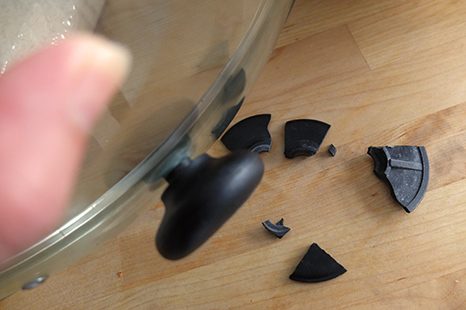 the glass lid of a pot fell to the ground, but only the spacing broke
the glass lid of a pot fell to the ground, but only the spacing broke

“together” brand adhesive tape
